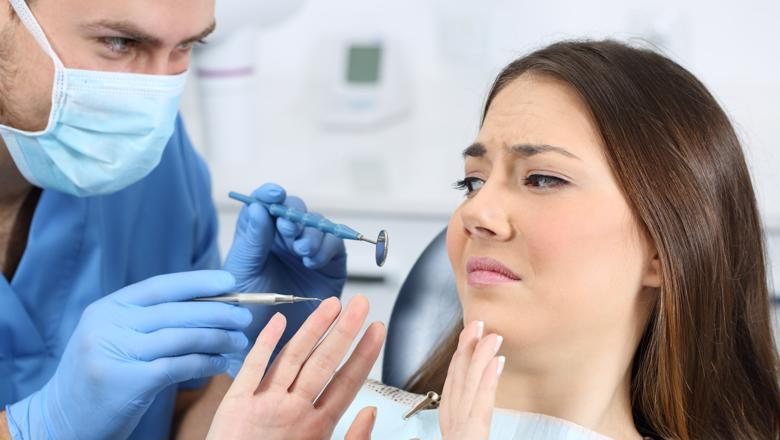If the mere idea of undergoing a dental checkup fills you with dread, rest assured, you’re not alone. The palpable anxiety, the racing heartbeat, and the clammy hands are sensations that many of us can relate to.
Dental phobia, also known as dentophobia, is more common than you might think. In this article, we’ll delve into the serious implications of dental phobia, explaining the potential risks it poses, as well as how to overcome this fear and seek regular dental care.
What Is Dental Phobia?

Dental phobia, in simple terms, is an intense and paralyzing fear related to dental visits or procedures. It’s more than just feeling a tad nervous; it’s an overpowering anxiety that can render the mere thought of a dental appointment terrifying.
This fear can manifest as panic attacks, a racing heart, and physical symptoms such as sweaty palms. Consequently, individuals with dental phobia may avoid dental care, even when it is essential for maintaining their oral health.
Dental Anxiety vs. Dental Phobia
When it comes to dental visits, some people experience nervousness. This anxiety may stem from concerns about the treatment or fear of discomfort during procedures. Generally, these individuals can still manage to visit the dentist, although it might be uncomfortable.
However, for others, dental fear is far more intense. Dental phobia is a different ball game altogether. It paralyzes individuals, making them avoid dental visits entirely.
People with high dental phobia experience extreme and irrational fear even at the thought of dental exams or entering a dental clinic. This fear can lead to panic attacks, a racing heart, or sweaty palms, making dental visits nearly impossible.
How Dental Phobia Impacts Overall Health
Dental phobia has a swift and noticeable effect on one’s oral health. People with dental phobia will avoid dental appointments, even when they suspect something might be wrong. Over time, avoiding dental visits can lead to serious repercussions for your overall health.
Loss of Teeth
Neglected dental problems will eventually lead to tooth loss, severely impacting daily life. Missing teeth impair chewing, leading to dietary limitations and nutritional deficiencies.
Speech can be affected, causing communication difficulties and social discomfort. Tooth loss also alters facial structure, diminishing oral functionality and aesthetic appeal.
Chronic Pain
Dental phobia can lead to enduring dental pain, disrupting daily life. Untreated issues like cavities or infections cause persistent discomfort, making eating, speaking, and sleeping difficult.
This pain can lead to dietary limitations, affect mental well-being, and hinder social interactions. Additionally, delaying treatment worsens the pain and can necessitate more invasive procedures.
Increased Risk of Diseases
Neglecting dental care due to dental phobia can result in infections and inflammation that may affect systemic health.
For instance, untreated oral infections can potentially spread throughout the body, contributing to conditions like heart disease and diabetes.
Moreover, chronic oral inflammation can weaken the immune system and increase the risk of various health issues, while the stress associated with dental phobia can compound these effects.
Psychological Distress
Dental phobia can take a heavy toll on an individual’s psychological well-being, unleashing a range of distressing emotions and mental health challenges.
This psychological distress is often driven by the unrelenting fear and avoidance of dental care, and it can manifest as anxiety, depression, and low self-esteem.
Is it Possible to Overcome Dental Phobia?

Overcoming dental phobia can be a gradual process, and it often involves a combination of strategies and support. Here are steps you can take to help overcome dental phobia:
- Recognize and Acknowledge Your Fear: The first step is acknowledging your fear of the dentist. Understanding that dental phobia is a real issue is essential in addressing it.
- Choose a Supportive Dentist: Look for a dentist who specializes in treating anxious patients or has experience with dental phobia. Communicate your fear with them so they can provide the necessary support and take your concerns seriously.
- Gradual Exposure: Consider making a series of short, non-invasive appointments to become accustomed to the dental environment. This might involve just meeting the dentist or having a simple examination.
- Communication: Open and honest communication with your dentist is crucial. Discuss your fears, ask questions about procedures, and work with your dentist to establish a signal for when you need a break during treatment.
- Relaxation Techniques: Practice relaxation techniques such as deep breathing, mindfulness, or progressive muscle relaxation before and during your dental appointment to reduce anxiety.
- Medication: In some cases, dentists may prescribe anti-anxiety medications or sedatives to help you relax during dental procedures. This should be discussed with your dentist and used only when necessary.
- Desensitization: Gradually expose yourself to dental-related stimuli, such as dental videos or images, to desensitize yourself to the fear.
- Bring a Support Person: Having a trusted friend or family member accompany you to the appointment can provide emotional support and reassurance.
- Seek Psychological Support: Consider consulting with a therapist or counselor who specializes in treating phobias or anxiety disorders. Cognitive-behavioral therapy (CBT) has been effective in helping individuals overcome dental phobia.
- Join Support Groups: Joining a support group or online forum for individuals with dental phobia can provide a sense of community and shared experiences.
Conclusion
Dental phobia may present a daunting challenge, but it’s a challenge that can be overcome. Through the steps of acknowledging your fear, finding the appropriate support, and taking gradual measures, you can triumph over it and reclaim authority over your oral health.
It’s crucial to bear in mind that letting fear hinder your dental care can result in significant physical and emotional consequences.
While the path to conquering this phobia may not be fast, it is undoubtedly worthwhile. Your smile, your overall health, and your self-esteem will all benefit from your determination to confront and conquer dental phobia.

Jean Smith is a fitness enthusiast and blogger who focuses on fitness and a healthy lifestyle. She is passionate about assisting people in living healthier lifestyles and is constantly on the lookout for new and creative methods to stay fit and healthy. Her articles are excellent resources for anyone interested in improving their health and fitness.
